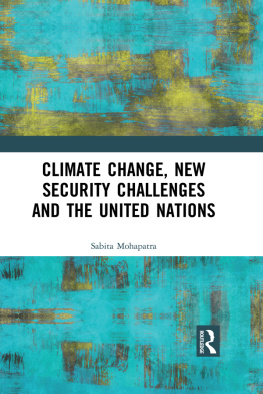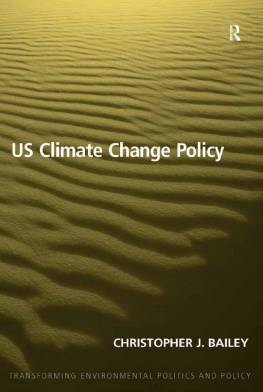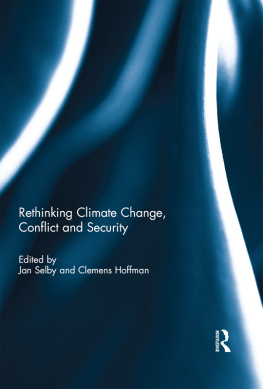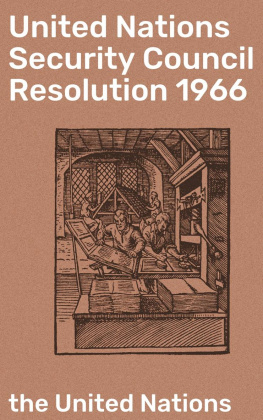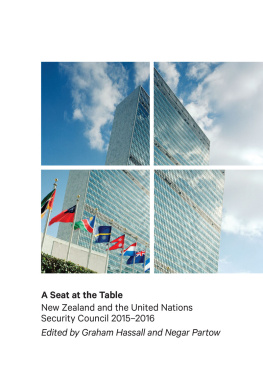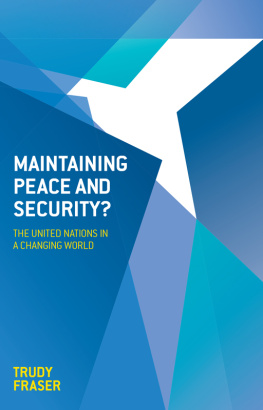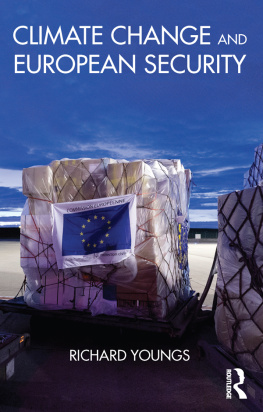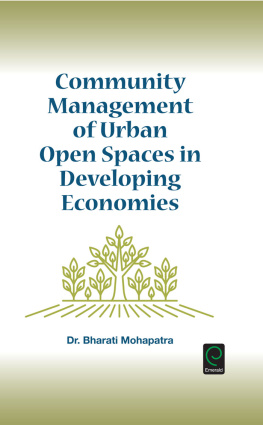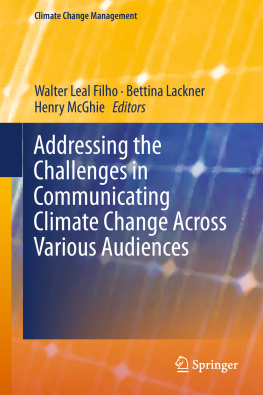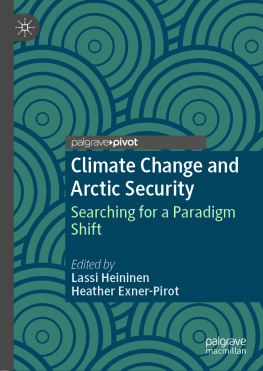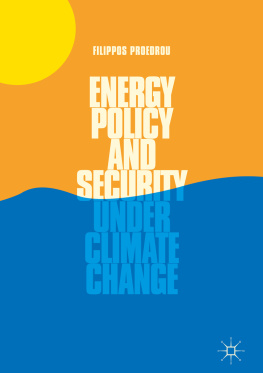Climate Change, New Security Challenges and the United Nations
First published 2018
by Routledge
2 Park Square, Milton Park, Abingdon, Oxon OX14 4RN
and by Routledge
711 Third Avenue, New York, NY 10017
Routledge is an imprint of the Taylor & Francis Group, an informa business
2018 Sabita Mohapatra and KW Publishers Pvt Ltd
The right of Sabita Mohapatra to be identified as author of this work has been asserted by her in accordance with sections 77 and 78 of the Copyright, Designs and Patents Act 1988.
All rights reserved. No part of this book may be reprinted or reproduced or utilised in any form or by any electronic, mechanical, or other means, now known or hereafter invented, including photocopying and recording, or in any information storage or retrieval system, without permission in writing from the publishers.
Trademark notice: Product or corporate names may be trademarks or registered trademarks, and are used only for identification and explanation without intent to infringe.
Print edition not for sale in South Asia (India, Sri Lanka, Nepal, Bangladesh, Afghanistan, Pakistan or Bhutan)
British Library Cataloguing-in-Publication Data
A catalogue record for this book is available from the British Library
Library of Congress Cataloging-in-Publication Data
A catalog record for this book has been requested
ISBN: 978-1-138-24379-8 (hbk)
ISBN: 978-1-315-27208-5 (ebk)
Typeset in Times New Roman
by KW Publishers
The doors of knowledge are always anchored in the attitude of gratitude that I am to express to those and sources I always remain indebted to. Acknowledgement is one way of such expression. This kind of humility is not belittling ones knowledge rather opening ones door for divergent ideas to come in for strengthening and refurbishing your ideas and thinking. It means demystifying ethnocentrism of knowledge. Ideas remain abstruse and have the chance of being eroded into oblivion unless tried to be put in black and white. Participation in national seminar sponsored by UGC as keynote speaker on climate change propelled me to think of writing a book on this, which ultimately finds its reification. This long intellectual stride commenced from the day I conceived of inking a book on this taking not only my own ideas but also ideas and facts from various conferences and seminars abroad and in India I attended, imbibing new thinking, approaches and views from scholars I met, and from books I rummaged through, getting articles, and papers published in various journals of international repute, and reached its logical conclusion when all these variant strands of ideas seeped through my in depth analytical acumen and rigour of scientific scrutiny to be blended nicely into a synthesised and pithy tapestry. If the collections from others are likened to bricks, mine is the architectural design, adding blood and flesh to the structure and finally shaping the ultimate attic in the form of this book. But for the help and cooperation from others it could not have been possible to bring out this book in the present form. My unbounded thanks and gratitude flow from the core of my heart to a litany of scholars, intellectuals and critics who have indirectly or directly helped me in this monumental task. From the fathomless depth of my heart I always convey my sense of gratification to a host of erudite scholars for the materials, articles and books they have provided me without exhibiting even a shred of evidence of their being hesitant.
Nothing happens in this universe even a blade of grass does not grow without Gods will. What I did here is due to His will and bliss. I proffer me heartfelt love and prayer to God and Gurus for showering on me their choicest blessings.
I am very much grateful to Prof. Dr Narottam Gaan, Prof. Dr Brahmananda Satpathy of Deptt. of Political Science, Utkal University, Bhubaneswar, Prof. Dr Prafulla Kumar Mishra, Vice Chancellor, Uttar Odisha University, Baripada, Dr. Ajit Kumar Tripathy, Ex-Chief Secretary and Development Commissioner, Ex-State Election Commissioner, Odisha, Bhubaneswar, Dr Prafulla Chandra Tripathy, an eminent Historian and educationist, Sri Niranjan Rath, an educationist and General Secretary, Loksevak Mandal, New Delhi, Sri Kaliprasad Samantray, an educationist, Bhubaneswar and Smt. Minati Mohapatra (my mother) for their valuable advice and guidance.
Dr Sabita Mohapatra
In the conventional paradigm the concept of security is essentially defined and articulated in terms of and around state and its corresponding military apparatus. In the state centric conceptualisation of security, the sources of security threats to the other remain anchored in the state itself. In international relations the security threat is always configured in terms of the other/outside/external. In the internal domain the sources of providing security to the insiders remain with the state. In its strive for perpetuating its survival and identity as a moral political community the state secures its own citizens. In this way the state remains predominantly the main referent object of security. This kind of conventionally established thinking and conceptualisation about security hovering on state continues to persist as the foundational mainstream of the foreign policy of major powers. Since the anarchical international system has been the guiding metaphor for states to position themselves in a self-help situation, the states taking on to them the onus of providing security to its insiders, ensuring survival and identity remain busy increasing competitively the military capability to overshadow the other in their bids to obviate security dilemma. It becomes their primary goal to look more invulnerable and impregnable militarily. This kind of understanding and conceptualising security centring on state precludes the policy makers from unveiling the other sources of security threats which are not necessarily state centric. Nowhere this was seen more glaringly than in the foreign policy of the two super powers during the cold war and other powers following them. When the two superpowers, former Soviet Union and the United States were engaged in a military showdown in Cuban Missile crisis in 1962 virtually on the brink of a nuclear Armageddon, the world could little notice the explosive significance of the theme that Rachel Carson points to in her famous book The Silent Spring published in the same year contesting the traditional state centric security. It is not the weapons that pose security threats but the use of pesticides, insecticides, fertilizers and chemicals in agriculture that can kill human beings. What she raised in this book is worth taking note of. Can the environmental crisis be not a security threat if the loss of human beings is the criterion? It matters little whether threats are military or non-military. Such an important issue raised in 1960s by Carson could hardly find any place in policy making and could not fit rightly into the procrustean bed of realism and neo-realism as to be securitised.
In the cacophony of sabre rattling that was taking place in the backyards of the arsenals of major powers and others was not heard the alarming note that Carson was tendering to the world community not until 1980s when there was an intellectual upsurge in the west echoing the former and contesting the adequacy of security under the panoply of realism and neo-realism. Amongst the proliferation of non-traditional sources of security threats in recent years what stands prominent is the environmental crisis and climate change which was due to the relentless interference of human beings into the functioning of nature in the name of development. The consequences of climate change in terms of global warming, sea level rise, storms and cyclones, spread of diseases and others could not even be addressed by the nuclear weapons. The question started nagging what is the use of spending frantically so much on weapons when these utterly fail to meet the devastating challenges of climate change. During the 1990s and more particularly after the end of the cold war, the world started thinking very seriously and accordingly taking action to address these impending dangers. What was neglected and could not find any place in the security agenda of policy makers has now come to the forefront of policy making of all countries of the world. Apart from this, many international institutions, NGOs and over and above all the United Nations have played a pioneering role in putting pressures on all states to take certain positive steps in not allowing the temperature of the earth increase beyond 2 degree Celsius as warned by IPCC.


